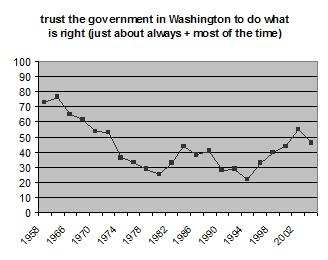[11/25/09: Please also see my statement on the Center’s federal audit.]
In Tampa, meeting with social studies teachers) For quite a few years, almost all of the federal government’s investments in civic education have been earmarked for the Center for Civic Education (CCE). In 2009, the Center’s earmark from the US Department of Education was $31.9 million. CCE spent most of those funds on “We the People,” a high school government curriculum, and “Project Citizen,” a curriculum for middle school students who study policy issues of their choice and develop responses. CCE provides free texts and materials and offers training for teachers.
The available evaluations suggest that students in CCE’s programs learn the material. We don’t know some other interesting facts about these programs, such as how many students they serve, the students’ demographic profile, or how much the programs cost per student. We cannot compare CCE’s impact or its cost-effectiveness against alternatives. Still, in the absence of public data on those matters, I will stipulate that CCE probably benefits the kids who experience its programs.
However, it is not the role of the federal government to finance curricula or materials that serve a small number of American kids, year after year. The federal government generally doesn’t select particular textbooks that seem beneficial and then provide them free of charge to limited numbers of schools where the teachers happen to request them. Nor should it provide programs like “We the People” or “Project Citizen” on those terms. Thirty-two million dollars is not nearly enough money to make a significant difference for the national student population, if it is spent that way.
Instead, a minimum of $32 million should be spent on innovation and growth. Competitive grants should be given to school districts, schools, other local government agencies, nonprofits, colleges, publishing companies, software developers, and other firms that propose to develop and test new approaches to civic education or to increase the scale or quality of their efforts. Thirty-two million dollars would be useful seed money, and over time it could benefit most American kids.
The Administration is asking Congress to end CCE’s earmark. That seems like the right thing to do, but the next step must be to create a competitive alternative run by the United States Department of Education. Congress and the Administration should fund civic education–the original purpose of American schooling–at a minimum of $32 million for the whole country. Criteria for competitive grants should include: innovation, rigorous evaluation, a potential to grow and survive without further federal funding, and a focus on engaging disadvantaged kids.
